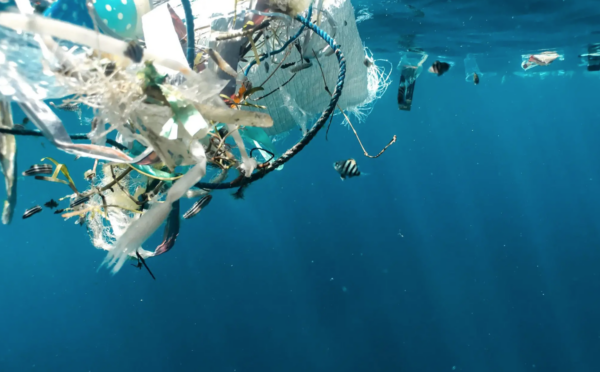- The 3rd United Nations Ocean Conference (UNOC 3), held in Nice in June 2025, clearly underscored the ticking time bomb that is the unchecked expansion of plastics across the globe’s oceans. Indeed, 80% of marine litter originates from land-based sources, whether intentionally or not, and 80% of this pollution is generated by 20 of the world’s most developed countries.
In a commendable—albeit belated—move, the international community has resolved to confront this pollution. On 5 March 2022, during the 5th United Nations Environment Assembly (UNEA-5) in Nairobi, Resolution 5/14 launched intergovernmental negotiations aimed at developing a legally binding treaty under the United Nations Environment Programme (UNEP), with the goal of putting an end to plastic pollution, including in the marine environment, through a legally binding instrument. The first five negotiation sessions have taken place (Punta del Este in 2022; Paris and Nairobi in 2023; Ottawa and Busan in 2024). The treaty was initially expected to be adopted in Busan in December 2024.
Unusually, for an environmental negotiation, the failure to conclude the treaty did not stem from a developed-versus-developing world divide. Instead, countries split into two groups:
- The High Ambition Coalition, focused on a legally binding treaty that addresses both plastic production and waste, initially composed of 65 countries from mainly the global North and South.
- The Coalition for the Sustainability of Plastics, composed mainly of oil-producing countries.
This latter group threatens to block the final negotiation session scheduled for 14 August 2025 in Geneva, citing the failure to agree on the procedure of the Intergovernmental Negotiating Committee and insisting that any final decision be made by consensus, not majority vote—just as they managed to do in Paris in May 2023.
Regardless of the outcome of these international negotiations, the Nice conference—held on the shores of the Mediterranean—could not overlook the specific challenges this sea faces regarding plastic waste. Although the Mediterranean represents only 1% of the world’s oceans, it contains 7% of all microplastics. Plastic accounts for 95% of marine litter in the region—equivalent to 500 tonnes during summer months.
This alarming situation has been the focus of numerous reports:
- The Barcelona Convention, UNEP-MAP-MED-POL, “Marine Litter Assessment in the Mediterranean” (2015);
- WWF, “Stop the Plastic Flood” (2019);
- SCP/RAC, “Guidelines to Address Single-Use Plastics” (2019);
- Plan Bleu, “Mod. 2050” (2025).
Encouraging political statements were made at Nice. On 9 June, in his opening speech at UNOC 3, President Macron declared: “We will strive to mobilize within the Mediterranean; this battle is essential. Plastics discarded on land end up in the canyons of the Mediterranean.” On 10 June, the French Minister for Europe and Foreign Affairs affirmed: “The Mediterranean Sea is suffocating under the weight of plastic pollution; the ocean will rebel against humanity.” Also on 10 June, the Environment Ministers and Heads of Delegation of the Parties to the Barcelona Convention celebrated its 50th anniversary—the first convention of its kind for a regional sea—and referenced plastic pollution nine times in their declaration.
This call to action from scientists and policymakers regarding the Mediterranean’s plastic pollution crisis demands a response. In December 2025, the 24th Conference of the Parties (COP 24) to the Barcelona Convention and its protocols will be held in Cairo.
In this context, the International Center for Comparative Environmental Law (CIDCE)—an international NGO accredited by UNEP and a partner of the Barcelona Convention for over 30 years—has taken the initiative to propose the development of an eighth protocol to the Barcelona Convention, specifically addressing plastic pollution.
Plastics have already been addressed in the Convention in various capacities but without a comprehensive approach. A new ad hoc protocol would rest on five binding legal instruments:
- The Barcelona Convention itself (1976);
- The offshore Protocol (1994);
- The Athens Protocol ( 1995) ;
- The Izmir Protocol (1996);
- The Madrid Protocol (2008).
A new protocol dedicated to plastics would make it possible to address land-based, coastal, and marine pollution in an integrated manner. In addition to these legal foundations, the protocol could build on numerous COP decisions of the Barcelona Convention that deal with plastics, as well as the accompanying ministerial declarations that consistently express concern and a sense of helplessness. One example is Decision IG 24/11, Annex II, adopted at COP 21 in Naples (2019), which addresses single-use plastic bags.
Adopting a regional protocol on plastic waste would anticipate the recommendations of the forthcoming global treaty, which will likely be broad in scope and require tailored regional implementation strategies.
Calls for such a regional protocol have already been made in several forums. Resolution 5/14 of UNEA-5 encourages regional cooperation (paragraph 3.1). The Regional Action Plan on Marine Litter of the Barcelona Convention, amended at COP 22 in Antalya (2021) via Decision 25/9, Annex III, also calls for an agreement to combat plastic pollution. A roundtable at UNOC 3 in Nice aimed to encourage the development of regional agreements within the framework of regional seas.
At UNOC 3, the Environment Ministers of the Barcelona Convention Parties—alarmed by the rapid spread of plastics in the Mediterranean—resolved to strengthen cooperation within the Convention. Therefore, it is urgent to call on all Mediterranean governments to propose and support a draft decision at COP 24 in Cairo to develop a Protocol on Plastic Pollution.


